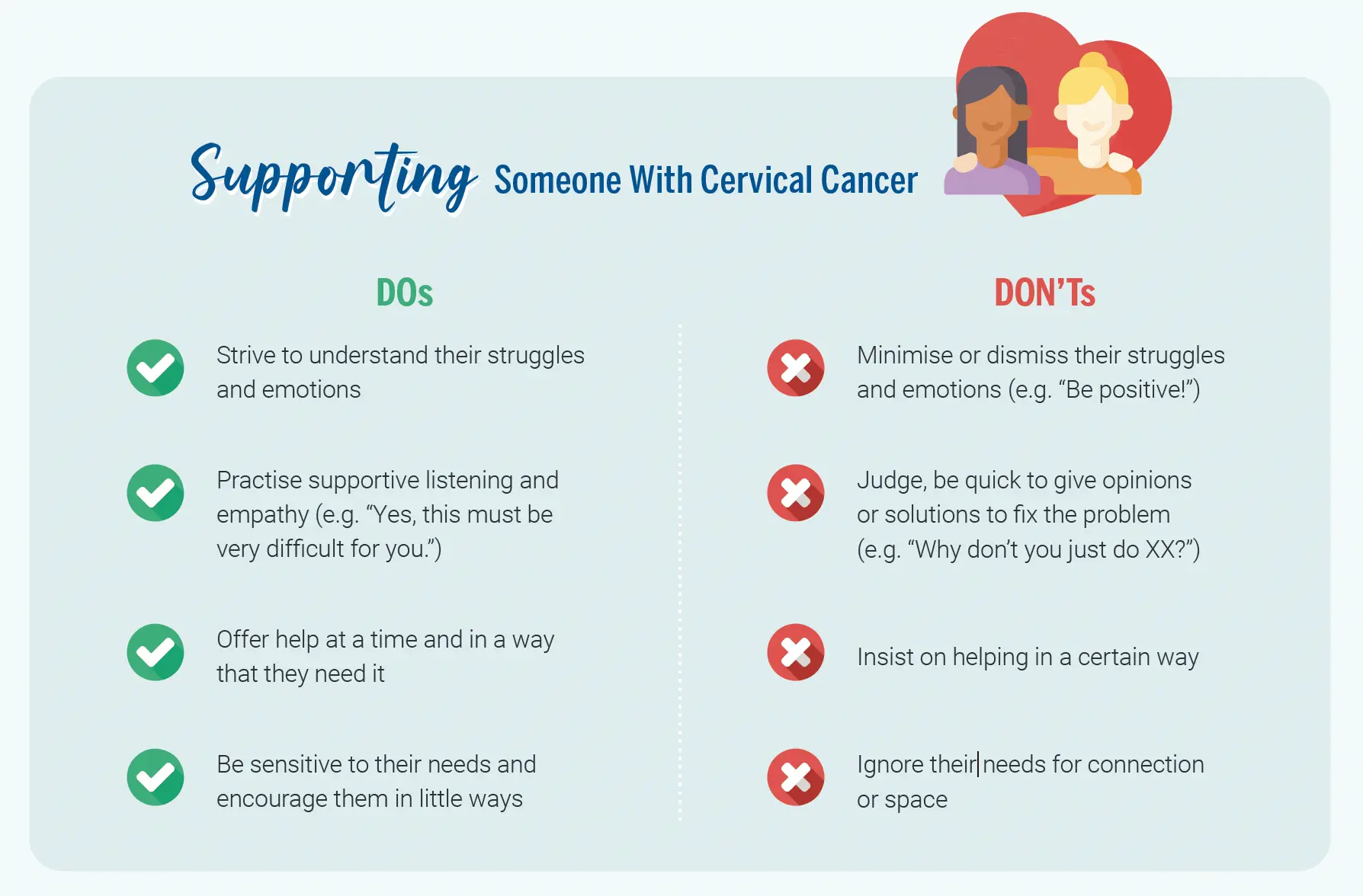News & Articles

Cervical Cancer and The Impact on Mental Health

Cervical cancer and its treatment can have implications on the mental health of women and result in the experience of loss. Counsellor Jaime Yeo shares more on how women can cope with these losses.
Cervical cancer is the fourth most common cancer among women worldwide1, and the tenth most common cancer among women in Singapore2. In 2020 alone, cervical cancer has affected an estimated 604,000 women and caused 342,000 deaths across the world3.
While most women would be concerned about the physical impact of cervical cancer and its treatment, less frequently discussed are the implications of the illness on their mental health. Some studies have shown that women with cervical cancer may be more susceptible to depression, anxiety, and decreased quality of life.
Possible physical changes
First of all, we have to understand how cervical cancer and its treatment may affect women physically. Depending on the treatment prescribed, some women may have to undergo a hysterectomy (a surgical procedure to remove the womb) and may also need their ovaries removed.
These procedures may result in a sudden onset of menopause, which may cause hormonal changes. Side effects could include infertility, vaginal dryness and sexual difficulties, in addition to other symptoms of menopause. Going through cancer or treatments like chemotherapy could also mean managing symptoms like pain, fatigue and nausea.
Changes and the experience of loss
These physical changes may affect a woman’s quality of life, relationships and sexual intimacy, sense of self, confidence, and family planning. When significant changes happen in our lives, there is always the experience of loss.
Different women experience this loss in different ways. For some, it is a loss of comfort, lifestyle or identity, while for others, it could be a loss of time, opportunities, or future plans to start a family.
Loss is a universal human experience, not just limited to women with cervical cancer, and with loss comes a myriad of different emotions and the need to adjust to a new normal.
Coping with loss during cervical cancer
Navigating through loss can be a confusing and challenging time. It is very much a grief process, creating a void in your life that seems so hard to make sense of and refill.
It is completely normal to feel sad or frustrated along the way. Give yourself the time and space you need to process the losses and gradually rebuild your life.
Here are some tips that may help:
Acknowledge your losses
Take some time to recognise or journal down the significant things in your life that have been 'lost' as a result of cervical cancer.
Acknowledging them does not mean you have to accept them fully now, but simply recognising that these things are or were important to you in your life.
Acknowledge also the feelings that may come with loss—shock, anger, disappointment or sadness—and allow yourself to grieve. Listening to others' experiences of loss and grief as you share yours may help you feel that you are not struggling alone. Loss is very much a universal experience and comes in different forms.
Take care of your emotions
Recognising what you are feeling and giving specific names to your emotions can help you feel more in control over them (e.g. fear, sadness, frustration, loneliness, etc.).
Understand why you may feel that way, and if there are specific or unhelpful thoughts (e.g. “I am weak and unhealthy because of my cancer”) or events which tend to trigger an emotion.
When your emotions feel overwhelming, take time to regulate them. You can do that by talking to someone, going for a walk/run, doing breathing or meditation exercises, praying, journaling or engaging in art activities. Find what works best for you.
Nurture relationships and connection with others
A strong support network goes a long way in helping you navigate through loss, even if it is a small circle of close family and friends. It also helps to recognise that there might not be anyone who is able to understand you completely and meet all your needs.
Nevertheless, support may come in little ways from different people. You could have a friend who is great in offering practical help, such as through meals and transport, while someone else could be a better listener with whom you feel comfortable talking about your deepest feelings.
Be open to connecting with others, and also learn how to communicate your needs and feelings across. At times, you may also need to create boundaries with those you are not ready to open up to.
You can also reach out to support groups with others who are going through cancer and can relate better to what you are experiencing, or speak privately with a mental health professional such as a counsellor.
Create meaning and hope
The flipside of a loss experience is that many people are also able to experience gain, learning and growth even in the most painful situations.
Remember that you are more than what has happened to you. Practise gratitude for the little and major positives in your life, hold on to hope, and be open to new possibilities and meaning that can emerge from the situation.
Getting support
Most people may associate a cancer diagnosis or treatment with the stereotypical portrayal of people with cancer i.e. weak, sickly, and with hair loss. For many women who receive a cancer diagnosis, the thought of losing their hair or physical appearance becomes terrifying.
There may also be some social perceptions, which is untrue, that cervical cancer is caused by risky sexual behaviours. Women may feel shame in being diagnosed or in disclosing their diagnosis with others.
If you feel that you need to speak to someone about what you are going through, reach out to a mental health professional. Sometimes there is hesitation due to the stigma regarding mental health. But talking to a professional can go a long way in helping you voice out and sort through some of your overwhelming thoughts and feelings, and gain new perspectives along the way.
You can go to a counsellor, therapist or psychologist for talk therapy, or decide to go to a psychiatrist who is a medical doctor who can prescribe medications that may help with your moods. At Parkway Cancer Centre, there are also counsellors with whom you can speak to.
1World Health Organization, 2022
2Singapore Cancer Registry Annual Report 2020
3World Health Organization, 2022

| POSTED IN | Cancer Treatments, Life after Cancer, Psychological Health |
| TAGS | cancer counsellor |
| READ MORE ABOUT | Cervical Cancer |
| PUBLISHED | 01 June 2023 |
